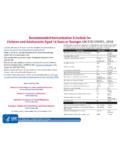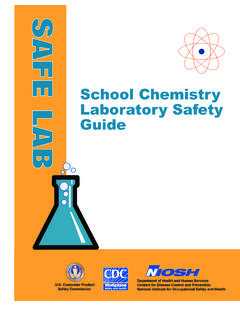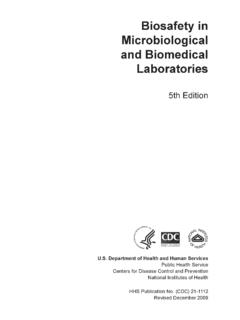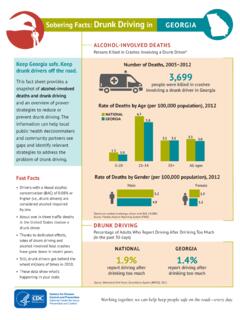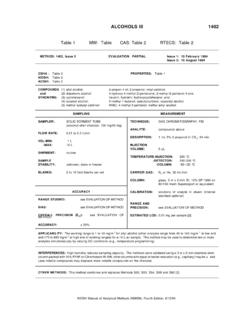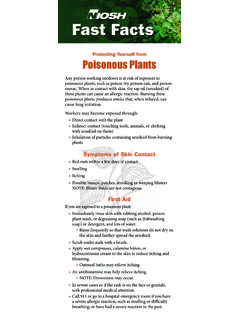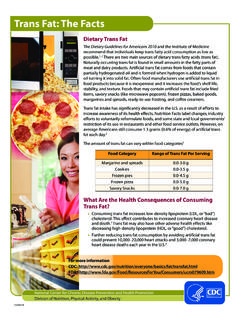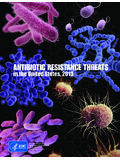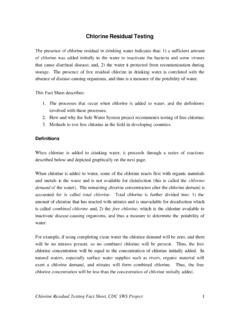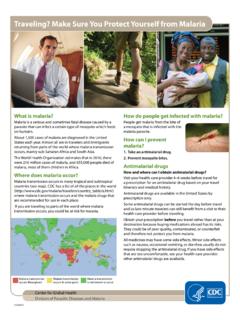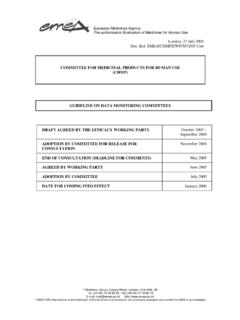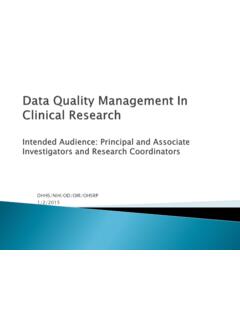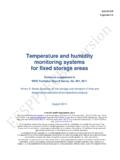Transcription of Myocarditis Outcomes Following mRNA COVID-19 …
1 Myocarditis Outcomes Following mRNA. COVID-19 Vaccination Preliminary data : data are subject to change Advisory Committee on Immunization Practices February 4, 2022. Ian Kracalik PhD MPH. Vaccine Safety Team CDC COVID-19 Vaccine Task Force Disclaimer The findings and conclusions in this report are those of the authors and do not necessarily represent the official position of the Centers for Disease Control and Prevention (CDC). Mention of a product or company name is for identification purposes only does not constitute endorsement by CDC or FDA. 2. Myocarditis Following mRNA COVID-19 vaccination Evidence from safety monitoring systems in multiple countries supports the finding of an increased, but still rare, risk of Myocarditis Following mRNA COVID- 19 vaccination*.
2 Risk: Highest in adolescents and young adults Males > females Following dose 2 > dose 1. Onset within a few days of vaccination, mostly within a week Severity of cases varies; most who presented to medical care have responded well to medications and rest Assessment of Myocarditis health effects after COVID-19 vaccination in progress* 3. CDC enhanced surveillance for Myocarditis Outcomes after mRNA COVID-19 vaccination in Vaccine Adverse Event Reporting System (VAERS) case reports*. Purpose: Assess functional status and clinical Outcomes among individuals reported to have developed Myocarditis after mRNA COVID-19 vaccination Methods: A two-component survey conducted at least 90 days after the onset of Myocarditis symptoms Patient survey: Focused on 12 29 years of age, ascertain functional status, clinical symptoms, quality of life, and need for medication or other medical treatment Healthcare provider ( , cardiologist): Gather data on cardiac health and functional status Timeline: data collection August 2021 January 2022.
3 * 4. Preliminary data from surveys of patients at least 90 days post Myocarditis diagnosis Outreach focusing on Myocarditis patients 12 29 years of age As of November 2021, VAERS had received ~989 reports of Myocarditis or myopericarditis after COVID-19 vaccination that met CDC case definition*. Of these, ~850 patient ages 12 29 years had reached 90 days post- Myocarditis diagnosis Of ~850 patients 90 days post diagnosis, 648 (81%) had a phone number listed Of the ~648 patients who were called, ~360 (56%) completed the survey;. ~270 (42%) were unreachable and 18 (3%) declined to participate For the 360 patients interviewed, time from Myocarditis onset to interview was 143 days (IQR: 131, 162).
4 * 6. Most patients diagnosed with Myocarditis were young males Median patient age was 18 years (IQR: 15 22);. Of the 360 patients 90 days post Myocarditis diagnosis, 86% (308) were male 38%. Male patients 120. 100 Female patients Number of patients 80 21%. 60 17%. 40 11%. 6%. 20 3% 2%. 2%. 0. M F M F M F M F. 12 to 14 15 to 19 20 to 24 25 to 29. Sex and age group 7. Race and ethnicity of Myocarditis patients (N=360). Number of patients 0 50 100 150 200 250. White, non-Hispanic 62%. Hispanic 20%. Asian, non-Hispanic 5%. Black, non-Hispanic 4%. Multi-racial, non-Hispanic 4%. Other, non Hispanic 3%. American Indian orAlaskan Native, non-Hispanic <1%.
5 *4 patients did not provide a response 8. Prior to their Myocarditis diagnosis, most patients received two doses of a COVID-19 vaccine 87% (314/360) received two doses of a COVID-19 vaccine Of those who received two doses, 98% (307/314) reported receiving both doses before they were diagnosed with Myocarditis 9% (31/360) had a positive COVID-19 test before their Myocarditis diagnosis 9. Self reported previous medical history among patients with Myocarditis after mRNA COVID-19 vaccination (N=360). 60 (17%) had any condition 11 (3%) had an arrhythmia 32 (9%) had a history of asthma 6 (2%) had congenital heart disease 7 (2%) had an autoimmune disorder 6 (2%) had a history of Myocarditis 5 (1%) genetic or chromosomal condition 2 (<1%) had Kawasaki disease 4 (1%) were immunosuppressed 1 (<1%) had previous heart failure 1 (<1%) had a history of Leukemia 1 (<1%) had type 1 diabetes 10.
6 Most patients with Myocarditis after vaccination reported being hospitalized at the time of Myocarditis diagnosis (n=360). 92% (324) were hospitalized 4% (13) were readmitted Following Myocarditis ; 8 of 13 (62%) were readmitted because of a concern with the heart 20% (71) were prescribed medication for their heart as of their last appointment with the provider 11. Missed school or work within the 2 weeks prior to the date of the interview reported among patients with Myocarditis after vaccination (N=360). 46 (8%) reported missing school Of these, 10 (37%) believed it was due to their Myocarditis 19 (5%) missed work Of these, 7 (37%) believed it was due to their Myocarditis 12.
7 Self-reported symptoms within 2 weeks prior to the date of the interview among Myocarditis patients (n=360). About half (49%). reported Chest pain yes 32%. Chest experiencing at pain no 68% least 1 symptom in the prior two yes 22%. Shortness weeks SOB. of breath no 78%. Palpitations yes 22%. Palpitations no 78%. yes 25%. Fatigue Fatigue no 75%. 0 50 100 150 200 250 300. Number of patients 13. EuroQol-5D-5L measurement of health status among patients who developed Myocarditis after vaccination (n=242). 14. Preliminary data from completed cardiologist or other healthcare provider surveys Outreach to cardiologists or other healthcare providers Of the 360/648 patients interviewed, ~346 (96%) listed contact information for a cardiologist or other healthcare provider Of the 346 providers with contact information listed, 229 completed a survey An additional 151 providers completed surveys they had submitted for multiple patients in VAERS or provided contact information via the VAERS report We were unable to contact 268 providers In total, 380 providers completed the survey with a median of 191 days (IQR.)
8 170, 216) from patient Myocarditis onset to date of provider survey 16. The proportion of Myocarditis patients cleared for physical activity by their cardiologist or healthcare provider has increased (n=380). At time of Myocarditis diagnosis, 83% of patients had restrictions on their physical activity 83%. Restricted At time of provider survey, at least 90 days post diagnosis, only 39% had restrictions 39%. Restricted *25 (7%) were unsure 17. Based on the cardiologists/healthcare provider assessment, most patients appear to have fully or probably recovered from their Myocarditis (n=380). 81% (309) of cardiologists or healthcare providers indicated the patient was fully or probably recovered Patient Recovery 250 66%.
9 Number of Patients 200. 150. 100. 15% 15%. 50. 1%. 0. Same cardiac status as Improved, but not Probably fully Fully recovered at the initial fully recovered recovered, awaiting Myocarditis diagnosis additional information *8 providers were unsure 18. Proportion of Myocarditis patients deemed to be fully or probably recovered by their healthcare provider (n=309). 19. Results of the most recent cardiac function test (n=380). 400. Normal or baseline Abnormal or elevated 350 93%. 300. Number of patients 250 77%. 200 53%. 46%. 150 64%. 100 90% 89%. 36% 23%. 50 7%. 10% 11%. 0. Troponin Cardiac MRI Echocardiogram Electrocardiogram Exercise stress test Ambulatory rhythm monitoring 20.
10 Abnormal findings from most recent cardiac function test 5 4. Ectopic rhythym Ambulatory rhythym monitoring 3 1. Conduction delays or blocks 8 5. Arrhythmia Patients fully or probably recovered 3 3. Other non-cardiac concern Exercise stress test 6 4. Other cardiac concern 1 1. Arrhythmia 1 0. Ectopic rhythym 3. Conduction delays or blocks Electrocardiogram 8. All patients 2 0. Arrhythmia 20. T wave abnormalities 32. 9. ST segment elevation 18. 17 Wall motion abnormalities 23. Cardiac MRI. 53. Inflamation or edema 68. 92. Late gadolinium enhancement 121. 120. 100. 80. 60. 40. 20. 0. Number of patients Overlap of abnormal findings among most recent cardiac function tests Troponin 51.
